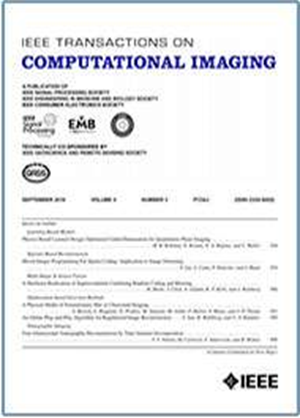Progressive Self-Supervised Learning for CASSI Computational Spectral Cameras
IF 4.2
2区 计算机科学
Q2 ENGINEERING, ELECTRICAL & ELECTRONIC
引用次数: 0
Abstract
Compressive spectral imaging (CSI) is a technique used to capture high-dimensional hyperspectral images (HSIs) with a few multiplexed measurements, thereby reducing data acquisition costs and complexity. However, existing CSI methods often rely on end-to-end learning from training sets, which may struggle to generalize well to unseen scenes and phenomena. In this paper, we present a progressive self-supervised method specifically tailored for coded aperture snapshot spectral imaging (CASSI). Our proposed method enables HSI reconstruction solely from the measurements, without requiring any ground truth spectral data. To achieve this, we integrate positional encoding and spectral cluster-centroid features within a novel progressive training framework. Additionally, we employ an attention mechanism and a multi-scale architecture to enhance the robustness and accuracy of HSI reconstruction. Through extensive experiments on both synthetic and real datasets, we validate the effectiveness of our method. Our results demonstrate significantly superior performance compared to state-of-the-art self-supervised CASSI methods, while utilizing fewer parameters and consuming less memory. Furthermore, our proposed approach showcases competitive performance in terms of reconstruction quality when compared to state-of-the-art supervised methods.用于 CASSI 计算光谱相机的渐进式自我监督学习
压缩光谱成像(CSI)是一种通过少量复用测量捕捉高维高光谱图像(HSI)的技术,从而降低数据采集成本和复杂性。然而,现有的 CSI 方法通常依赖于从训练集进行端到端学习,这可能难以很好地泛化到未见过的场景和现象。在本文中,我们提出了一种专为编码孔径快照光谱成像(CASSI)量身定制的渐进式自监督方法。我们提出的方法可完全根据测量结果重建 HSI,而无需任何地面真实光谱数据。为此,我们在一个新颖的渐进式训练框架中整合了位置编码和光谱群中心点特征。此外,我们还采用了注意力机制和多尺度架构,以提高 HSI 重建的鲁棒性和准确性。通过在合成和真实数据集上的广泛实验,我们验证了我们方法的有效性。我们的结果表明,与最先进的自监督 CASSI 方法相比,我们的方法性能明显更优,同时使用的参数更少,消耗的内存更少。此外,与最先进的监督方法相比,我们提出的方法在重构质量方面也具有竞争力。
本文章由计算机程序翻译,如有差异,请以英文原文为准。
求助全文
约1分钟内获得全文
求助全文
来源期刊

IEEE Transactions on Computational Imaging
Mathematics-Computational Mathematics
CiteScore
8.20
自引率
7.40%
发文量
59
期刊介绍:
The IEEE Transactions on Computational Imaging will publish articles where computation plays an integral role in the image formation process. Papers will cover all areas of computational imaging ranging from fundamental theoretical methods to the latest innovative computational imaging system designs. Topics of interest will include advanced algorithms and mathematical techniques, model-based data inversion, methods for image and signal recovery from sparse and incomplete data, techniques for non-traditional sensing of image data, methods for dynamic information acquisition and extraction from imaging sensors, software and hardware for efficient computation in imaging systems, and highly novel imaging system design.
 求助内容:
求助内容: 应助结果提醒方式:
应助结果提醒方式:


